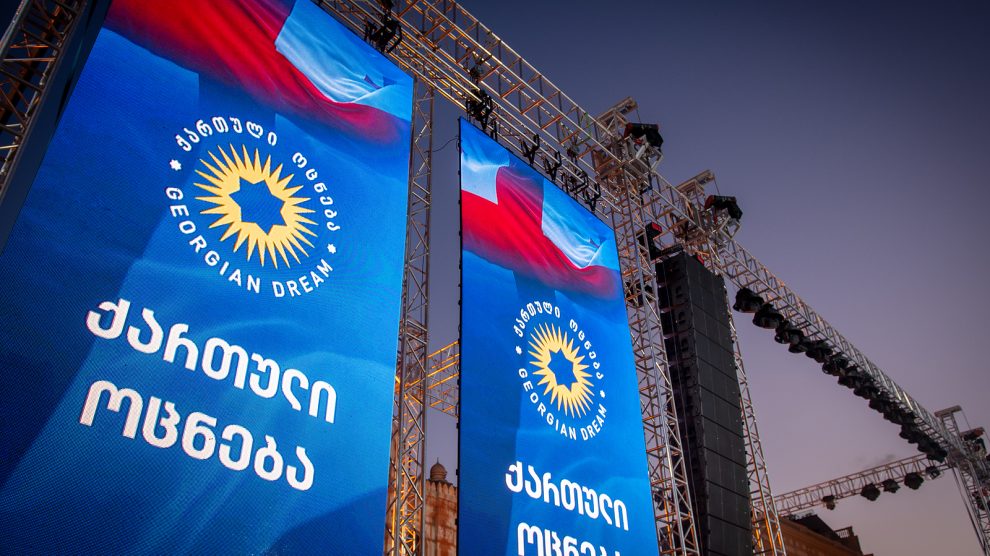Upcoming elections on October 26 present a crucial opportunity for Georgian voters to shape their political future.
Georgia is facing an unprecedented challenge which could alter the country’s EU trajectory. The country’s European future is under threat from the current government, led by the Georgian Dream party, which manipulates public opinion with pro-Russian narratives in hopes of sabotaging Georgia’s European aspirations.
In the process, it purposefully turns a blind-eye to the international financial support provided by the United States and the European Union over the past three decades.
After months of protests by pro-European Georgians who aspire to see their country follow its EU path, the October 26 parliamentary elections represent a last chance to reverse this dangerous rapprochement with Russia.
The outcome of this vote will determine whether Georgia retains its EU candidate status and unlocks financial assistance from the EU and the US. Otherwise, the EU enlargement train, which includes Moldova and Ukraine, will depart without Georgia.
‘Do you choose war or peace?’
The European Union has confirmed that it will cancel its promise of 121 million euros in funds allocated to support Georgia’s economic development and its path toward EU membership, citing Tbilisi’s increasing repression of dissent.
Significant efforts have been made by Georgian Dream to steer the country away from democratic principles. Georgian Dream instrumentalises the fear of war that many Georgians feel, by being presented with a distorted version of the truth about the conflict in Ukraine.
This is evident in the videos from the ruling Georgian Dream party, where the election campaign is framed as a simple choice: ‘If you want war and to suffer like the Ukrainians, vote for the opposition; if you want peace, vote for us.’
Meanwhile, the opposition is basing its campaign on a single message: ‘A prosperous life with principles and values in the European Union, or chaos and aggression in Russia.’
If Georgia does not join the European Union, the country will remain dependent and under the grip of Russian, as well as Chinese and Iranian influence, without much protection from the European Union.
The current government purposefully applies new legislation that goes against EU principles, such as the ‘foreign agents law’ or the “anti-LGBT law”, in order to push away the EU, and in the process ignore in an undemocratic manner the demands of Georgian citizens, of which more than almost 90 per cent are pro-European.
What does it mean to be Russia’s neighbour?
Georgia’s location in the South Caucasus gives it a complex geopolitical position, perfectly in between the West and Russia.
While far from the European continent, it remains close to the hearts of Europeans. Its border with Russia exposes it directly to Russian influence, which is already deeply rooted in its two pro-Russian breakaway regions—Abkhazia and South Ossetia.
Approximately 7,000 Russian soldiers occupy military bases on Georgian territory, instilling an austere environment for Georgians who have to live with the constant reminder that Russia could interfere in the country’s prosperity at any chosen time.
Georgians will not allow a Belarus-style autocracy to take hold of their country. Most of their political elites have studied in the West, and their mentality is far removed from the Soviet mindset.
Despite being direct neighbours with Russia, the two countries do not have a shared cultural and linguistic identity. Anti-Russian sentiment, especially in Tbilisi, is particularly strong. How could they use the language of an aggressor that invaded their country 16 years ago? On the streets of Tbilisi, central boulevards such as Rustaveli are adorned with European Union flags, Ukrainian flags, and slogans such as ‘Glory to Ukraine’ and ‘Stop the RuZZians’.
These realities should also give us food for thought when considering other former Soviet states, like Moldova.
Georgians have spent the last decade demonstrating their stance and their aspirations for a European future. Their struggle in the streets, with their blue flags and yellow stars, will persevere as long as they will have a government who leans towards Russian interests rather than respecting the voice and demands of the majority.
Pro-EU Georgians are willing to stand in front of their oligarch Bidzina Ivanishvili’s rifle for the European dream, as the taste of the ‘Georgian Dream’ becomes more and more bitter.
Window of opportunity
The upcoming elections on October 26 present a crucial opportunity for Georgian voters to shape their political future.
Georgians have one final chance to seize the window of opportunity they have been granted. The outcome of these elections will have lasting implications for Georgia’s European aspirations.
Georgian civil society and the 89 per cent of Georgians who support integration into the European Union are currently held captive by oligarchic power and interests.
Troubled times lie ahead for Georgia if Georgian Dream claims victory, with mass protests expected. The deepening political crisis and the erosion of civil liberties have raised concerns that the country could face a revolution this autumn.
This article was co-authored by Constance Victor, a programme assistant at European Council on Foreign Relations and a Caucasus and Eastern Europe researcher.
Unlike many news and information platforms, Emerging Europe is free to read, and always will be. There is no paywall here. We are independent, not affiliated with nor representing any political party or business organisation. We want the very best for emerging Europe, nothing more, nothing less. Your support will help us continue to spread the word about this amazing region.
You can contribute here. Thank you.


